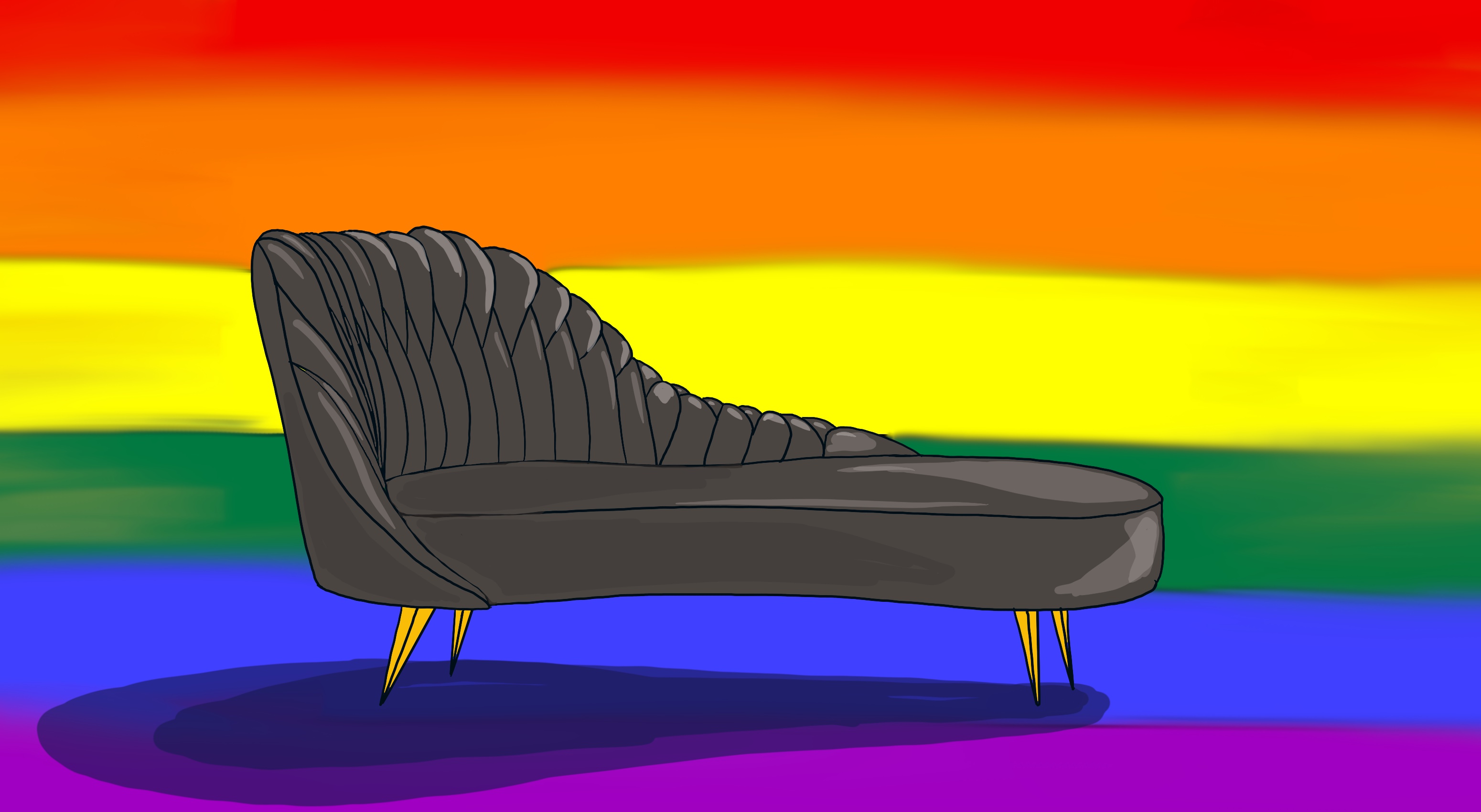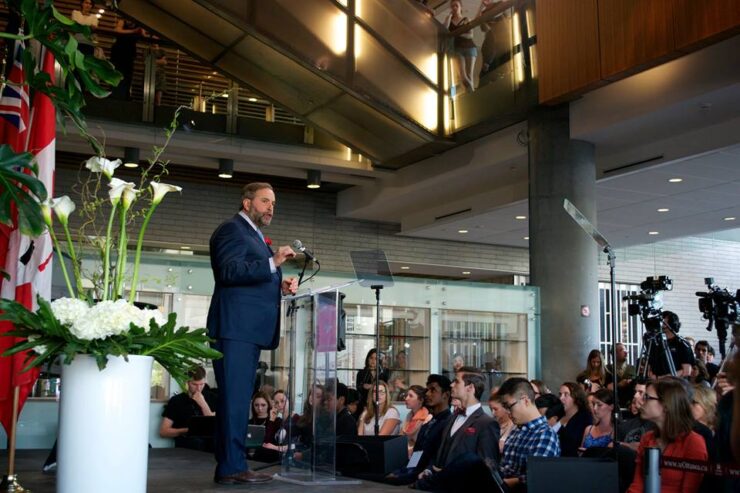From discriminatory diagnoses to public outings, sexuality and gender identity add layer of complexity to accessing help
Content warning: Suicide
With five student deaths in the past ten months and a multitude of complaints regarding inadequate mental health services, many University of Ottawa students are calling on the school’s administration to improve its mental health system.
In response, president Jacques Frémont announced the establishment of a mental health task force, which is set to implement a number of recommendations from a recent report on wellness at the school and will hold a town hall later this month. The administration is also looking to partner with local hospitals and reach out to other universities for their input as well, according to Frémont.
But it’s not just the general student population of the university who are requesting widespread improvements in mental health services and resources offered by the university. Hundreds of communities make up the student body, and of those, LGBTQ2+ communities are some of the most vocal.
Studies show that LGBTQ2+ communities have some of the most serious mental illness statistics of any demographic. A 2011 report for the Centre of Disease Control and Prevention showed that LGBTQ2+ youth are three to four times more likely to attempt suicide than their heterosexual peers.
A 2012 study conducted by Rainbow Health Ontario analyzing the mental health of trans people in Ontario found that 77 per cent had seriously considered suicide, while 45 per cent had attempted suicide.
The U of O isn’t immune to the discrimination that members of LGBTQ2+ communities can face, something the Rainbow Health Ontario report cites as a contributing factor to their higher risk of mental illness. Couple that with a health care system that is already under so much strain, and the challenges are considerable.
Obstacles to accessibility
Some students complain about the lack of specialization in LGBTQ2+ issues among the counsellors and mental health professionals at the U of O’s Health Services.
Jake is a third-year student at the U of O, whose name has been changed to protect his identity. Only partially out and living with a homophobic roommate, he was eager for his input to be heard under the condition of anonymity.
Jake said that the walk-in clinic is “not for everyone, as they only deal with specific issues.”
“There’s a long way to go with the university, (but) it’s even longer outside,” said Matthew Bromley, a co-ordinator of the University of Ottawa Students’ Union’s Pride Centre and a psychology student, in regards to receiving help from the clinic.
Bromley said that, due to the lack of specialized or educated counsellors at the walk-in clinic, his family doctor often refers him out to health professionals within Ottawa but outside of the university.
“I’ve run into so many issues with health professionals on campus that have been so ignorant about issues, and even if well-meaning, just disrespectful in the end,” said Bromley.
During the transition to university, LGBTQ2+ youth may find themselves feeling isolated, depressed, or overwhelmed, experts say. And in the absence of specialized care on campus, Bromley highlights the importance of building a personal support system.
“I would say surround yourself with even just any friends, like straight friends who are just accepting of you, but it’s always important to have LGBTQ2+ friends because they understand the struggle of not being accepted by your family and especially having the resources that you might need on campus,” said Jake.
Shelley Colter, an Ottawa-area psychotherapist who specializes in PTSD and trauma in veterans, first responders, and LGBTQ2+ communities, echoes his advice.
“So the first thing is self-care. We’ll start with the basics: getting enough sleep, eating nutritious (foods), exercising, developing your own support circle, (which) may not be people who are queer,” she said. “It definitely helps that people are queer, (but) queer-friendly is just as important.”
Outside of the university, accessing mental health resources may be even more challenging. Students may not have the proper insurance coverage, or financial means, or could even be rejected on discriminatory grounds.
The American Medical Association found that in 2019, 25 per cent of transgender individuals who sought coverage for hormones in the past year were denied and 55 per cent of those who sought coverage for transition-related surgery in the past year were denied.
Only in 2019 did the World Health Organization remove gender dysphoria as a medical condition from its list of mental health diagnoses. Though this is a great step forward, it shows how there’s still a long way to go for dismantling pseudoscience rooted in homophobia and transphobia.
A 2018 poll by the Harvard T.H. Chan School of Public Health, NPR, and the Robert Wood Johnson Foundation discovered that nearly one-sixth of LGBTQ2+ adults have experienced discrimination at the doctor’s office or in another health care setting, while a fifth say they have avoided seeking medical care out of fear of discrimination.
Providing proper mental health resources and hiring specialists who are respectful, educational, and accessible can allow for students to become more comfortable with accessing health care, even in difficult situations.
Bromley no longer advises fellow LGBTQ2+ students to go to the campus pharmacy after he said he was publicly outed there twice while refilling his medication.
“The first time I was able to handle myself, I was so mad. I was like ‘what the fuck.’ And the second time, (it happened) with a different person, I had a panic attack. I went home, I missed all my classes,” he said.
This type of unprofessional conduct can be dangerous or triggering, and it can deter students in crisis from seeking out the help they need.
Room for improvement
Students say proper education for counsellors on the specific demands of LGBTQ2+ communities and the conflicts they face is desperately required, as well as specialized professionals who know how to respectfully handle LGBTQ2+ peoples and their concerns.
“I feel like so long as you know that we do go through different struggles,” said Eliane Fiset, a first-year LGBTQ2+ nursing student. “I think when you’re already mentally ill and you have a lot of internalized homophobia from growing up in homophobic families or homophobic communities, it can contribute a lot more stress to your life, and so I feel like it’s important for therapists to realize that.”
Bromley highlights the critical difference between diversity and tokenism among the university’s counsellors and mental health professionals.
“Hire people who are Indigenous in the community, hire people who are queer in the community, hire people at all aspects in the community and all different sectors because mental health is not just going on when you’re having a crisis and you need someone to counsel you,” said Bromley. “It’s people on a day-to-day (basis) treating you with respect and kindness and dignity.”
Jake said he believes that the university’s support for LBGTQ2+ communities shouldn’t end at the rainbow crosswalk unveiled during the university’s Pride Week this past October.
“They claim to want to support LGBTQ2+ students, they claim they want to be there,” said Jake. “Don’t just put rainbows everywhere and say, ‘Oh, we support the queer students.’ ”
Somewhere over the rainbow
Despite the hardships and confusion members of LGBTQ2+ communities — especially younger students who are recently independent — are tasked with facing when attempting to access care, students say reaching out for help if needed is still of the utmost importance.
“It’s a hard time and it can be really difficult, finding resources that you can talk to that make you feel safe, especially if you’re younger and you’re still going through (things) with your parents, but it does get better,” Fiset said.
Bromley encourages the use of the Pride Centre as a safe space for LGBTQ2+ students, providing them with the assistance they might need on specific resources and professionals outside of the university and within the Ottawa community.
As the university begins to address the gaps in the mental health care system, Bromley and Fiset said they hope that the administration will put a little extra attention into catering toward the specific needs of LGBTQ2+ communities.
A non-comprehensive list of local mental health resources appears below…
On campus…
- University of Ottawa Health Services (UOHS), 100 Marie-Curie Private
- Offers counselling, psychiatric services, individual, couple or family therapy, access to psycho-educational groups and referrals to specialists off-campus
- Student Academic Success Service (SASS), 100 Marie-Curie Private
- Offers individual counselling, peer-counselling, workshops, online therapy and group counselling using new stepped model; referrals
- Faculty mentoring centres (locations differ by faculty)
- Specialized mentoring services catered to the needs of students in each faculty
Off campus…
- Mental health hotlines…
- Drugs and Alcohol Helpline: 1-866-531-2600
- Canada Suicide Prevention Service phone available 24/7: 1-833-456-4566
- Fem’aide: 1-877-336-2433
- Good2Talk: 1-866-925-5454
- Kids Help Phone: 1-800-668-6668 or text CONNECT to 686868
- Mental Health Crisis Line: 613-722-6914
- Distress Centre of Ottawa and Region: (613) 238-3311
- Ottawa Rape Crisis Centre: 613-562-2333
- Tel-Aide Outaouais: 613-741-6433
- Trans Life Line: 1-877-330-6366
- Walk-in counselling clinics (six Ottawa locations)…
- Somerset West Community Health Centre (55 Eccles Street)
- South-East Ottawa Community Health Centre (1355 Bank Street)
- Family Services Ottawa (312 Parkdale Avenue)
- Jewish Family Services of Ottawa (300-2255 Carling Avenue)
- Ottawa Community Immigrant Services Organization(959 Wellington St. W)
- CFS/SFC Ottawa (310 Olmstead Road)
- Community health and resource centres (13 in Ottawa)
- Carlington Community Health Centre (900 Merivale Road)
- Eastern Ottawa Resource Centre (215-1980 Ogilvie Road)
- Nepean, Rideau and Osgoode Community Resource Centre (1547 Merivale Road, Unit 240)
- Rideau-Rockcliffe Community Health Centre (225 Donald Street)
- Sandy Hill Community Health Centre (221 Nelson Street)
- South East Ottawa Community Health Centre (1355 Bank Street)
- Western Ottawa Community Resource Centre (2 MacNeil Court)
- Centretown Community Health Centre (420 Cooper Street)
- Lowertown Community Resource Centre (40 Cobourg Street)
- Orleans-Cumberland Community Health Centre (240 Centrum Boulevard)
- Pinecrest-Queensway Community Health Centre(1365 Richmond Road)
- Somerset West Community Health Centre (55 Eccles Street)
- Vanier Community Service Centre (270 Marier Avenue)
Warning signs of suicide include:
Talking about wanting to die
Looking for a way to kill oneself
Talking about feeling hopeless or having no purpose
Talking about feeling trapped or being in unbearable pain
Talking about being a burden to others
Increasing use of alcohol or drugs
Acting anxious, agitated, or recklessly
Sleeping too little or too much
Withdrawing or feeling isolated
Showing rage or talking about seeking revenge
Displaying extreme mood swings
The more of these signs a person shows, the greater the risk. If you suspect someone you know may be contemplating suicide, you should talk to them, according to the Canadian Association for Suicide Prevention.





